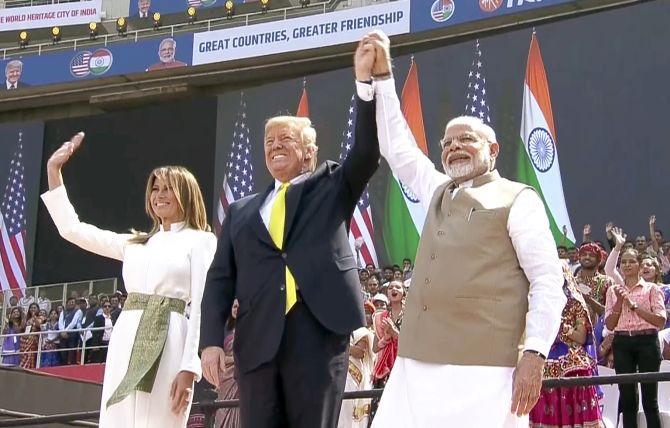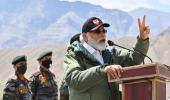'The fatal mistake for the USSR was the invasion of Afghanistan.'
'Quite possibly the fatal mistake for the Chinese empire is the assault on Ladakh,' observes Rajeev Srinivasan.

- Part 1 of the column: Ladakh Stand-off: Be prepared to meet fire with fire
Indian should become a formal US ally
There is a school of thought that India should abandon its posture of strategic ambiguity because of the fear of China.
The corollary is that it should jump in bed with the Americans, as they are the only other game in town.
C Raja Mohan of the National University of Singapore, writing in the Indian Express, urged India to 'be realistic'.
Gideon Rachmann of the Financial Times declared that 'India picks a side in the new cold war'.
There are two ways of looking at this.
One the one hand, there is nothing wrong with cooperating with other nations with similar interests.
Japan, Vietnam, Indonesia, Taiwan, Australia and the US each have their (different) issues with China, and it is likely that together these countries could 'contain' China to a great extent.
Therefore in terms of short term objectives, yes, they could come together, and the Quad is one such grouping.
The Quad has been floundering for some years, partly because of mutual suspicions between Australia and India (perhaps dating back to the days of Sinophile Kevin Rudd as Australian PM).
As circumstances change, the bad blood may be history, and Australia may become a full participant in the Malabar exercises at sea along with the US, Japan and India.
On the other hand, there is an implicit assumption about a G2.
People still haven't gotten out of the old Cold War days of a bipolar world, where the US and the USSR competed for influence; only now it is the US and China competing.
Can it become a G3? I once had an argument with Bruno Macaes about India's chances to be the third pole.
He was dismissive, suggesting that the European Union, and a still-potent Russia would be better candidates for that.
That is a questionable assumption.
While it has a nuclear stockpile, Russia is now reduced to the level of a supplicant to China, as the US continues to be hostile.
The demographic collapse there means that one day China will just walk into Siberia, and there will literally not be enough Russians and not enough guns to stop them.
The European Union continues to be riven by internal squabbles and does not have a sense of purpose.

Meanwhile, India will likely become the third largest economy in nominal (not PPP) terms by 2030, overtaking Germany and Japan.
In parallel with its new-found economic strength, India will also be forced to invest in its military capacity.
Then comes the question of why India should be just a secondary power: Its strategic intent should be to be one of the poles in a multi-polar world.
India is one of very few candidates (others include Brazil and South Africa) that are big enough to be a global power.
This train of thought suggests several ideas: One, that India could be the swing power that determines whether China or the US will be top dog (especially as the duo seem to be heading into the Thucydides Trap of actual warfare), and that gives India bargaining power which it should use; two, that India should take all possible support from the US, because by sheer geography, it is unlikely to have a conflict with the US, unlike with China which is on its borders after swallowing the historic buffer state Tibet.
Recent statements by US Secretary of State Mike Pompeo that the US is going to move troops from Europe because of 'threats to India' and Southeast Asia, and that it is moving three carrier battle groups into the Pacific, are interesting to a limited extent.
First, there is no immediate possibility that India will allow US troops to be stationed on its soil.
Second, any such move will require its pound of flesh, quite likely an Indian military presence in Afghanistan allowing the US to declare victory, cut and run.
Third, aircraft carriers are only a symbolic threat unless the US wants to get into a serious shooting war in Asia: as we remember, India itself stared down the US 7th fleet that steamed into the Bay of Bengal in 1971.
And these days, China does have carrier-killer missiles.
India has been very friendly with Japan, somewhat tenuous with the US, and a little distant with Australia: that's been the history of the Quad.
This status quo will probably continue; there's no real point in India throwing its lot in with the US unless there is a significant quid pro quo.

Chinese overreach
Hubris leads to imperial overreach.
This is how many great powers decline, by taking on more than they can reasonably handle.
To an extent, post-Berlin Wall America, with its thinkers declaring 'the end of history', suffered from this syndrome, by involving itself in distant wars intended to evangelise its vision of how the world should be.
More strikingly, the collapse of the USSR shows how unstable an imperial power might be.
There had been few indications, if memory serves me right, leading up to the event that the Soviet empire was on the verge of falling apart.
There were no large uprisings in the conquered Central Asian or Baltic states or in the Ukraine: they were all resentful of the overweening Russian presence, but they were not actively expressing separatist tendencies.
China is in an analogous state now.
The territories conquered by the overlord Hans are seething with resentment, but unable to revolt openly, as they will be crushed.
The Soviets were in economic trouble from the fact that the Americans had lured them into an arms race they really couldn't afford.
The Chinese are in economic trouble from the fact that many countries are actively seeking to decouple from them, by rebuilding their supply chains elsewhere.
Granted, at the moment China still appears to be the world's factory, and scale and cost reasons might lead to some products continuing to be monopolised by China.
However, there is reason to think that the trickle of companies heading for the exits will become a flood.
Vietnam and other Southeast Asian nations have already benefited from this exodus.
More companies will move: Apple, for instance, is planning to shift 20% of its production to India.
A concerted economic boycott may well be catastrophic for China.
The imperial arrogance may soon turn to panic.
Especially in the wake of the Wuhan coronavirus, there is almost no trust in China, and that's no way to run trade.
If the economy begins to flounder, the empire may fall apart sooner than we think.
In addition, China is opening too many fronts at once: as Minhaz Merchant says, it may backfire, as they are busy in Ladakh, the South China Sea, Senkaku Islands, Taiwan, Uighur re-education camps, spats with Australia and Canada, infiltration of universities and media everywhere, not to mention the Wuhan virus.
There is a day of reckoning, and being stretched can well be fatal.
The fatal mistake for the USSR was the invasion of Afghanistan.
Quite possibly the fatal mistake for the Chinese empire is the assault on Ladakh.
Rajeev Srinivasan is one of Rediff.com's earliest columnists.
You can read Rajeev's columns here.
Feature Production: Aslam Hunani/Rediff.com











 © 2025
© 2025